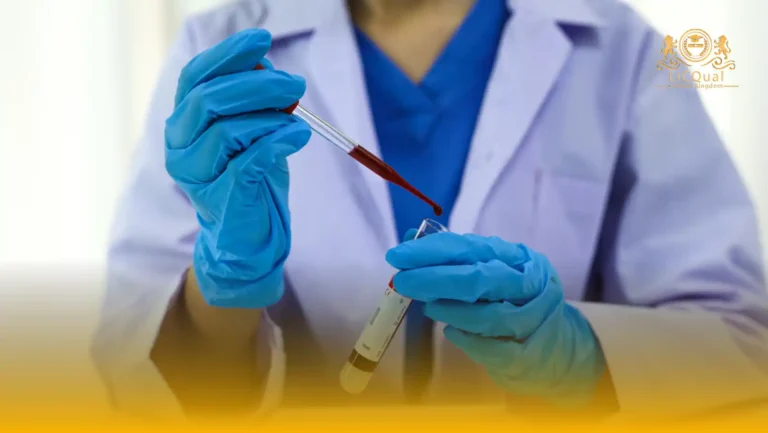The LICQual Level 3 Certificate in Healthcare Compliance and Regulations is a specialised qualification designed for healthcare professionals who wish to enhance their career prospects, expand their expertise, and strengthen their Continuing Professional Development (CPD). This qualification is not intended for fresh candidates but is aimed at learners with prior experience in healthcare or management who seek to deepen their knowledge of compliance frameworks, regulatory standards, and governance in healthcare organisations.
Healthcare compliance plays a vital role in safeguarding patient safety, maintaining service quality, and ensuring that organisations operate within legal and ethical boundaries. Through this course, learners will develop a strong understanding of national and international healthcare regulations, risk management principles, ethical considerations, and best practices for compliance monitoring. The programme equips learners with the skills to identify potential areas of non-compliance, implement corrective actions, and contribute to a culture of accountability and transparency.
Centres delivering this qualification must ensure high-quality training by employing competent and qualified staff with relevant industry expertise. In addition, centres must provide access to up-to-date learning materials, case studies, and resources that allow learners to apply theoretical knowledge to real-world healthcare scenarios. By maintaining these standards, centres guarantee that learners are fully supported in achieving successful outcomes.
Upon completion, learners will be able to apply compliance and regulatory knowledge effectively within their professional roles, supporting organisational performance, protecting patient welfare, and ensuring adherence to legal and ethical obligations across the healthcare sector.
Course Overview
Qualification Title
LICQual Level 3 Certificate in Healthcare Compliance and Regulations
Total Units
6
Total Credits
24
GLH
120
Qualification #
LICQ2200717
Qualification Specification
To enroll in the LICQual Level 3 Certificate in Healthcare Data Analytics, applicants must meet the following criteria:
|
Qualification# |
Unit Title |
Credits |
GLH |
|---|---|---|---|
|
LICQ2200717-1 |
Introduction to Healthcare Compliance |
4 |
20 |
|
LICQ2200717-2 |
Healthcare Regulatory Frameworks and Standards |
4 |
20 |
|
LICQ2200717-3 |
Legal and Ethical Considerations in Healthcare |
4 |
20 |
|
LICQ2200717-4 |
Risk Management and Compliance Monitoring |
4 |
20 |
|
LICQ2200717-5 |
Quality Assurance and Organisational Governance |
4 |
20 |
|
LICQ2200717-6 |
Implementing Compliance Strategies in Healthcare Settings |
4 |
20 |
By the end of this course, learners will be able to:
Unit 1: Introduction to Healthcare Compliance
By the end of this unit, learners will be able to:
- Explain the core principles and importance of compliance in healthcare.
- Describe the role of governance in ensuring regulatory adherence.
- Identify the key elements of an effective compliance framework.
- Evaluate the impact of compliance on patient care and organisational performance.
Unit 2: Healthcare Regulatory Frameworks and Standards
By the end of this unit, learners will be able to:
- Analyse national and international healthcare regulatory systems.
- Explain the roles and responsibilities of healthcare regulatory bodies.
- Compare accreditation and certification standards in healthcare organisations.
- Assess the implications of non-compliance with regulatory requirements.
Unit 3: Legal and Ethical Considerations in Healthcare
By the end of this unit, learners will be able to:
- Interpret relevant healthcare legislation and regulations.
- Apply ethical principles to decision-making in healthcare compliance.
- Discuss professional codes of conduct and their impact on practice.
- Evaluate scenarios involving legal and ethical dilemmas in healthcare.
Unit 4: Risk Management and Compliance Monitoring
By the end of this unit, learners will be able to:
- Identify potential compliance-related risks in healthcare organisations.
- Apply risk assessment techniques to compliance monitoring.
- Explain methods for reporting and documenting compliance risks.
- Evaluate strategies to mitigate risks and strengthen compliance systems.
Unit 5: Quality Assurance and Organisational Governance
By the end of this unit, learners will be able to:
- Explain the relationship between compliance, quality assurance, and governance.
- Analyse how compliance supports patient safety and service excellence.
- Evaluate governance structures that enhance accountability in healthcare.
- Apply compliance frameworks to organisational quality improvement.
Unit 6: Implementing Compliance Strategies in Healthcare Settings
By the end of this unit, learners will be able to:
- Design practical strategies for embedding compliance within healthcare organisations.
- Demonstrate methods for training staff on compliance requirements.
- Apply monitoring tools to evaluate compliance effectiveness.
- Assess the role of leadership in promoting a culture of compliance.
This qualification is ideal for:
- Healthcare professionals who want to strengthen their knowledge of compliance, governance, and regulatory standards.
- Hospital administrators and managers seeking to ensure their organisations meet legal, ethical, and quality requirements.
- Compliance officers and quality assurance specialists working in healthcare organisations who aim to enhance their professional expertise.
- Risk managers and patient safety coordinators responsible for monitoring compliance and implementing regulatory frameworks.
- Healthcare supervisors and team leaders wishing to improve governance and accountability within their departments.
- Medical and healthcare support staff who want to expand their skills in compliance monitoring and organisational governance.
- Professionals seeking career progression into compliance, regulation, or healthcare management roles.
- Learners committed to Continuing Professional Development (CPD) and improving healthcare standards through effective compliance practices.
Centres offering the LICQual Level 3 Certificate in Healthcare Compliance and Regulations must meet specific requirements to ensure high-quality delivery and learner success. Approved centres are expected to demonstrate compliance with international training standards and provide an environment that supports professional learning.
Key Centre Requirements:
- Qualified and Competent Staff – Centres must have trainers and assessors with relevant academic qualifications and professional experience in healthcare compliance, regulations, and governance.
- Access to Learning Resources – Centres should provide learners with up-to-date study materials, case studies, regulatory frameworks, and digital resources that support effective learning.
- Assessment and Quality Assurance – Robust internal assessment procedures and quality assurance systems must be in place to ensure fairness, accuracy, and consistency of learner achievement.
- Facilities and Learning Environment – Centres must provide suitable classroom, online, or blended learning environments equipped with the necessary tools for interactive training and assessment.
- Commitment to CPD – Teaching staff and assessors should actively engage in Continuing Professional Development (CPD) to remain updated on healthcare compliance regulations and best practices.
- Support Systems for Learners – Centres must have appropriate academic and administrative support in place to guide learners throughout their qualification journey.
- Compliance with Regulatory Standards – Centres are expected to align their delivery with industry regulations, ethical standards, and recognised quality benchmarks.
Assessment and Verification
All units within this qualification are subject to internal assessment by the approved centre and external verification by LICQual. The qualification follows a criterion-referenced assessment approach, ensuring that learners meet all specified learning outcomes.
To achieve a ‘Pass’ in any unit, learners must provide valid, sufficient, and authentic evidence demonstrating their attainment of all learning outcomes and compliance with the prescribed assessment criteria. The Assessor is responsible for evaluating the evidence and determining whether the learner has successfully met the required standards.
Assessors must maintain a clear and comprehensive audit trail, documenting the basis for their assessment decisions to ensure transparency, consistency, and compliance with quality assurance requirements.







